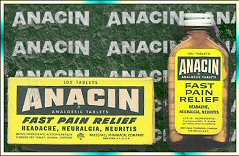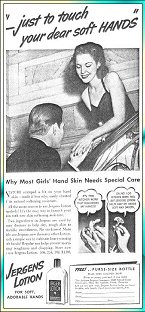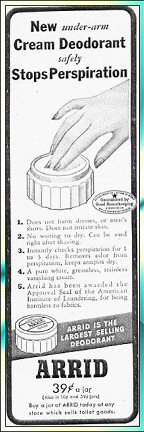Radio Advertising
& Controversy
"Arrid does not
formulate Jimmie Fidler�s opinions,
he reports the news as he sees it."
--- Ken Niles

Lincoln, Me. (DG)---
This was one thing a radio sponsor wasn�t comfortable with in their
relationship with the program it sponsored--- controversy of any
kind. When controversy occurred, sponsors reacted to it in one of three possible
ways:
1.) The sponsor immediately cancelled
sponsorship of the program.
2.) The sponsor continued sponsorship of
the program, but distanced itself from the controversy.
3.) Continue sponsorship of the program as if
nothing had happened. |
While #2 and #3 actually occurred at one time or another, the most
common sponsor reaction was #1. No one was immune to cancellation no
matter how popular the star or program was with the radio listeners. Let�s
take a look at some incidents that occurred over the airwaves--- and the
sponsors� reaction to those incidents.
On WOR/Mutual�s HERE�S MORGAN, Henry Morgan was
famous for getting into trouble with his radio sponsors and network
management. When he had to present a commercial live, the sponsors
kept their fingers crossed he wouldn�t say anything that was
considered outrageous.
Unlike Arthur Godfrey, who gently ribbed his sponsors, Morgan
varied his technique from gentle ribbing to outright fraud. A prime example
of the fraud accusations was Life Savers, "The Candy With
The Hole." On a live commercial, Morgan said the Life
Savers people were ripping off the public by drilling holes in the
candy. To solve this "problem," Morgan offered the
listeners the chance to buy the drilled out holes under the name of
"Morgan�s Mint Middles." The listeners thought Morgan�s
"commercial" was funny. Unfortunately, the Life Savers
people did NOT! The next day, Life Savers
cancelled sponsorship of Morgan�s program, and Morgan had yet another
chewing out session with network management. In a bit of irony, Life
Savers Holes was sold during the early 1990�s. It was a plastic
package full of the same drilled out holes Morgan talked about 50 years
earlier!
 The wrong choice of words caused the demise of the popular EASY
ACES
serial program in 1945. For a decade, the program maintained a good
relationship with its sponsor, Anacin. Despite the long
relationship, it quickly ended. It all started when one of the personnel from the sponsor made a complaint about some
music used on the program. Goodman Ace, who starred and created the
program, had a "hands off" approach on what was to be presented
on the air. No one from the sponsor ever challenged him until that day in
1945. Unfortunately, Ace didn�t take too kindly what that member of the
sponsor�s staff said. He returned the favor and criticized the makers
of Anacin for the way the product was packaged. Like Ace,
the people who made Anacin didn�t appreciate anyone
criticizing what they did. In an ugly stalemate, Anacin
immediately terminated its sponsorship of EASY ACES, and
"Radio�s Laugh Novelty" went off the air. The wrong choice of words caused the demise of the popular EASY
ACES
serial program in 1945. For a decade, the program maintained a good
relationship with its sponsor, Anacin. Despite the long
relationship, it quickly ended. It all started when one of the personnel from the sponsor made a complaint about some
music used on the program. Goodman Ace, who starred and created the
program, had a "hands off" approach on what was to be presented
on the air. No one from the sponsor ever challenged him until that day in
1945. Unfortunately, Ace didn�t take too kindly what that member of the
sponsor�s staff said. He returned the favor and criticized the makers
of Anacin for the way the product was packaged. Like Ace,
the people who made Anacin didn�t appreciate anyone
criticizing what they did. In an ugly stalemate, Anacin
immediately terminated its sponsorship of EASY ACES, and
"Radio�s Laugh Novelty" went off the air.
 For 15 years, Jergens Lotion was the sponsor of the popular JERGENS
JOURNAL with Walter Winchell. During that time, Winchell did not
and would not mince words on what he said on the air, which usually
stirred up controversy. Since he was popular with the listeners, the Andrew
Jergens Company stayed with Winchell no matter how controversial
he got--- but there would be a breaking point. For 15 years, Jergens Lotion was the sponsor of the popular JERGENS
JOURNAL with Walter Winchell. During that time, Winchell did not
and would not mince words on what he said on the air, which usually
stirred up controversy. Since he was popular with the listeners, the Andrew
Jergens Company stayed with Winchell no matter how controversial
he got--- but there would be a breaking point.
In 1948, Winchell was getting a little too extreme and controversial.
While the Andrew Jergens Company withstood many of Winchell�s
comments over the years, his latest vicious attacks proved to be the straw
that broke the camel�s back. Despite the high ratings, the company
cancelled sponsorship of THE JERGENS JOURNAL.
The sponsor was concerned that Winchell�s venomous tirade was losing the
women in the listening audience. Of course, it was the women who bought
and used Jergens Lotion. After the cancellation, Winchell
continued to get respectful ratings under his new sponsors, but the
"Lotions Of Love" between him and Jergens came to an end.
When it comes to controversy, Jimmie Fidler was one of the best to stir
things up. He earned the reputation as one of the most hated reporters
of Hollywood gossip (that is, hated by the Hollywood stars and movie
companies). Like Walter Winchell, Fidler didn�t mince words on what he
reported on the air. Although the listeners enjoyed the dirt Fidler dug
up, he had an erratic radio career, because he was too controversial. Before 1942, Fidler bounced from network to network and sponsor to
sponsor. His longest stint on the air at that time was from 1937-1939 on
NBC�s Red Network for Special Drene Shampoo.
 Fidler began a consistent run on the air in 1942, when he hosted a
15-minute program on the Blue Network (later known as ABC)
under the sponsorship of Arrid Deodorant. He still reported
the latest Hollywood gossip, and he also stirred up hard feelings with the
movie industry. The only difference, he had a sponsor and network that
stayed with him on a consistent basis (1942-1950). Fidler began a consistent run on the air in 1942, when he hosted a
15-minute program on the Blue Network (later known as ABC)
under the sponsorship of Arrid Deodorant. He still reported
the latest Hollywood gossip, and he also stirred up hard feelings with the
movie industry. The only difference, he had a sponsor and network that
stayed with him on a consistent basis (1942-1950).
There were two reasons why Arrid sponsored Fidler�s
program. First, it was the deodorant many famous Hollywood stars used--- and
second, it distanced itself from what Fidler reported on the air. At the
end of each broadcast, announcer Ken Niles presented the disclaimer
"Arrid doesn�t formulate Jimmie Fidler�s opinions, he reports the news as he sees it."
From 1933-1938, Philco Radios maintained a consistent
sponsorship of Columbia Network journalist Boake Carter. During
this time, he was one of the most popular newscasters--- and the most
controversial. He combined the latest news with his own personal
commentary of that news. Carter�s blistering comments got him into
frequent trouble with government officials, labor unions, and the
Columbia Network. Through it all, Philco maintained its
sponsorship of Carter�s newscasts. According to the people in charge of Philco
advertising, it was easily summed up this way--- Carter knew how to
present the news on radio, and the Philco Company
knew how to make and sell radios. If Carter didn�t tell the company how
to make radios, Philco won�t tell Carter what to say on
the air. It was a deal that worked out well with newscaster, sponsor, and
the radio listeners.
Controversial moments in the radio industry brought out the best--- and
worst in the radio sponsors. The sponsoring of a radio program was
inclined to stay on the air longer than sustaining programs (programs
without a sponsor). For those programs with sponsors, it paid to keep them
happy. One wrong move, and the sponsor was quickly looking for another
program.
|